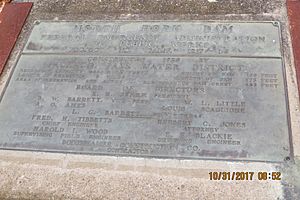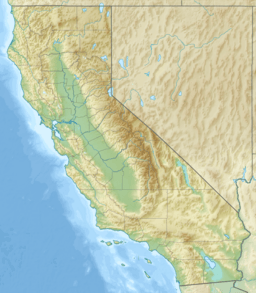Pacheco Reservoir facts for kids
Quick facts for kids Pacheco Lake |
|
|---|---|
| Location | Diablo Range, eastern Santa Clara County, California |
| Coordinates | 37°03′41″N 121°17′41″W / 37.06139°N 121.29472°W |
| Type | Reservoir |
| Primary outflows | North Fork Pacheco Creek |
| Catchment area | 67.2 sq mi (174 km2) |
| Basin countries | United States |
| Max. length | 2 miles (3.2 km) |
| Max. width | 1,500 feet (460 m) |
| Surface area | 197 acres (80 ha) |
| Water volume | 6,150 acre-feet (7,590,000 m3) |
| Surface elevation | 476 feet (145 m) |
Pacheco Reservoir is a man-made lake, also called a reservoir, located in the Diablo Range in California, U.S.A.. It was created by building a dam across the North Fork of Pacheco Creek. This lake is found north of State Route 152 in eastern Santa Clara County. It's about an hour's drive from downtown San Jose.
The water from Pacheco Creek, which fills the lake, eventually flows into Monterey Bay through the Pajaro River.
Contents
North Fork Dam: Building the Lake
| North Fork Dam | |
|---|---|

Plaque atop the North Fork Dam at Pacheco Reservoir
|
|
| Country | United States |
| Location | Santa Clara County, California |
| Coordinates | 37°3′1″N 121°17′29″W / 37.05028°N 121.29139°W |
| Opening date | 1939 |
| Owner(s) | Pacheco Pass Water District |
| Dam and spillways | |
| Type of dam | Earthen |
| Impounds | Pacheco Creek |
| Height | 100 feet (30 m) |
| Length | 600 feet (180 m) |
| Elevation at crest | 483 feet (147 m) |
| Width (crest) | 20 feet (6.1 m) |
| Dam volume | 325,000 cubic yards (248,000 m3) |
| Reservoir | |
| Creates | Pacheco Lake |
| Total capacity | 6,150 acre-feet (7,590,000 m3) |
| Catchment area | 67.2 square miles (174 km2) |
| Surface area | 197 acres (80 ha) |
| Maximum length | 2 miles (3.2 km) |
| Maximum width | 1,500 feet (460 m) |
| Normal elevation | 476 feet (145 m) |
The water in Pacheco Lake is held back by the North Fork Dam. This dam is made of earth and was finished in 1939. It stands 100 feet (30 m) tall and stretches 600 feet (180 m) long. The top of the dam is 483 feet (147 m) above sea level.
Fish and the Dam
The North Fork Dam creates a barrier for certain fish, like steelhead trout (a type of rainbow trout). These fish cannot swim upstream past the dam to reach their usual spawning grounds. However, rainbow trout that live in the fast-moving water above the dam grow well.
Sometimes, in late spring, the water flow in the creek can get very low. This can make it hard for young steelhead and rainbow trout to survive.
Pacheco Reservoir Expansion Project
In 2018, a big project was planned to make Pacheco Reservoir much larger. Three water districts, including the Santa Clara Valley Water District (known as "Valley Water"), received a lot of money for this. The goal is to increase the reservoir's capacity from 5,500 acre-feet to 140,000 acre-feet. An acre-foot is the amount of water needed to cover one acre of land with water one foot deep.
What the Expansion Involves
The expansion project will include building a new earthen dam. This new dam will be placed upstream from the current North Fork Dam. The project also needs a pump station, a pipeline, and other important structures. The total cost for this large project is expected to be around $969 million.
Where the Water Comes From
Besides the water that naturally flows into the reservoir from North Fork Pacheco Creek, the expanded reservoir will also store water from another source. This extra water will be pumped from the San Luis Reservoir. San Luis Reservoir is located to the east, along Highway 152. It is part of a larger water system called the Central Valley Project.
Benefits of the Expansion
- Water for People: If there's a drought or another emergency, the much larger reservoir could provide enough water for about 1.4 million people for a whole year.
- Better Fish Habitat: Water released from the reservoir into Pacheco Creek will be carefully managed. This will help keep the creek flowing and improve the living conditions for South Central California Coast steelhead trout.
- Wildlife Support: The project will also supply water to eight different wildlife refuges in Central California. This helps protect many animals and their homes.
Valley Water is currently working on the design for the project. They are also studying how the project might affect the environment. A report on the environmental impacts is expected by 2022. Construction on the expansion is planned to start in 2024.
 | Misty Copeland |
 | Raven Wilkinson |
 | Debra Austin |
 | Aesha Ash |



